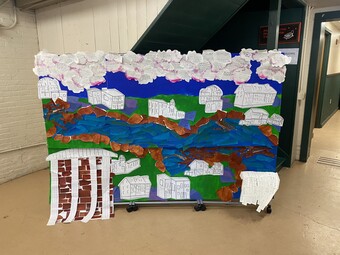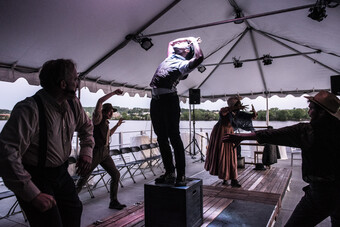On Immersive Theater
The Senses to Take the Wall Down—Part 4: The Gentle Touch of Fantasy
A six-part series on the words, challenges, craft, and zeitgeist of the immersive theater movement
There are times when public intimacy is shocking. I don’t mean sex. I mean intimacy—a familiarity and significance of touch. When truthful, I find it exquisitely surprising. I am not speaking of the rigorous and violent sexuality you might see on screen. I am not speaking of catcalls on the street or bold flirtations at a bar. I am speaking of touch. I am speaking of skin, our largest organ, and the information it takes in. I am speaking of waiting for a bus and seeing the careful, specific threading of fingers with another. I am speaking of the bend in the elbow that responds to these fingers. I am speaking of the angle the head tilts. I am speaking of the tiniest lift of the corners of a mouth. I am speaking of the other hand reaching out to touch the tree at their side, the rough bark awake in the hand.
I may have imagined that whole thing. It may be my fantasy. But these moments are true in a way that can be astonishing.
At times in the new immersive world, touch has become offhand titillation. It seems like we are treating touch as theater treated early video projection work—carelessly and without an understanding of its power and place. It is, honestly, my biggest turn off when I am part of the audience within an open-frame production, and I am grabbed and prodded. To touch seems to be acceptable by calling the experience “immersive” without earning permission, and I am here to say we must stop. Much like video has become a craft that can refine and add to a theatrical experience, so can physical interaction.
Touch has an important place in open-frame work. It is our most powerful resource—but we must craft it with the care we craft each other element. In fact, with more care, because we are stepping into a world where audience members need to grant true permission for it to be impactful. Touch is a sense we may turn off to function in our day-to-day lives. Are you aware of the smooth texture of your keyboard or the hard wood of your seat? Are you processing the feel of your jeans against your skin?
Are you reaching out and touching the crumpled leaf as it falls to the ground?
Imagine yourself at a table in a garden. You are there for an experience, but you don’t know what it may be. You are sitting open-eyed and jittery, anticipating what you might see. A woman a few tables over reaches out and touches the crumpled leaf. She is fascinated by it and unselfconsciously brings it back to her table, rubbing the dry, orange autumn between her fingers. And then, somehow, a leaf falls on your table. She looks over at you, and you find yourself touching your own leaf. She is talking to you about the fall and how it changes. And when you touch that leaf—are you touching the season of autumn? I wonder if thirty minutes later when she joins your table and touches your hand, you might be more awake to the feel of her skin against yours? That touch is not thrown away. It is an event. It changes everything. It is not the rough, crispy leaf; it is the soft, warm skin. It feels intimate and the fantasy of what you imagine your relationship with this person to be is suspended in theatrical belief.
There is much to unpack about touch, but two things must at least be mentioned: the training of performers and interactive storytelling. Performers are often asked to do incredibly brave things, but in any open-frame work we must create a safe space. The garden interaction I describe above may feel innocuous. But the actor that can work with a leaf, then shift her attention to an audience member, and take her time and take that person’s hand as an event—that actor is extraordinary. These actors share my fascination with how we can change the experience of time and space through touch. They also know that I value that moment of interaction and it must be earned. We, with our designers, uncover the way that handshake can lead to something more—not necessarily between these two people, but for the audience member’s journey within the larger piece of work.
For open-frame work the invitation of audience is often its most important step, and often the performer is a huge part of its success. Once the rules of the relationship between the play and audience have changed, so do the rules between performer and audience. Yet both the performers and audience members are human beings with wants and fears. What rabbit hole does that handshake launch the audience through? I define interactive performance as performance that takes place between audience and performer. I define interactive storytelling as performance that takes place between audience and performer to forward the story; without this interaction, the story could not move forward in the same way. The interaction is imperative. The way in which the above conversation relates to the larger piece of work defines whether it is storytelling or not, but if you are using it to forward storytelling and you want the audience to invest, the details and specificity behind the leaf conversation can create an exponential investment. An hour later, a crumpled leaf can feel like the significance of a broken heart.
The example of the leaf and the handshake is an example of awakening. We can awaken the audience’s sense of touch with care, rather than a tug and pull. But I think it should be mentioned that in open-frame work where the audience is more of a voyeur, the same awareness of touch is just as important. A promenade production that brings me close to the sexual interaction of two actors or another bathing can be incredibly intimate for the performer and the audience. This intimacy must be earned. My skin might flush with excitement, but if I am unsure of my place I will react strongly. I may run away, shut down, or reach out. I must have clarity of my own place in this intimacy and its place in the larger experience. Without this clarity I cannot let go, so I break the fantasy. Touch is a precious and powerful tool. A tool that we must explore with care or it will break the tenuous trust of our open-frame audience.









Comments
The article is just the start of the conversation—we want to know what you think about this subject, too! HowlRound is a space for knowledge-sharing, and we welcome spirited, thoughtful, and on-topic dialogue. Find our full comments policy here
A very thoughtful and poetic essay that brings to mind the penultimate verse of one of my favorite songs:
"Through autumn's golden gown we used to kick our way
You always loved this time of year
Those fallen leaves lie undisturbed now
'Cause you're not here"